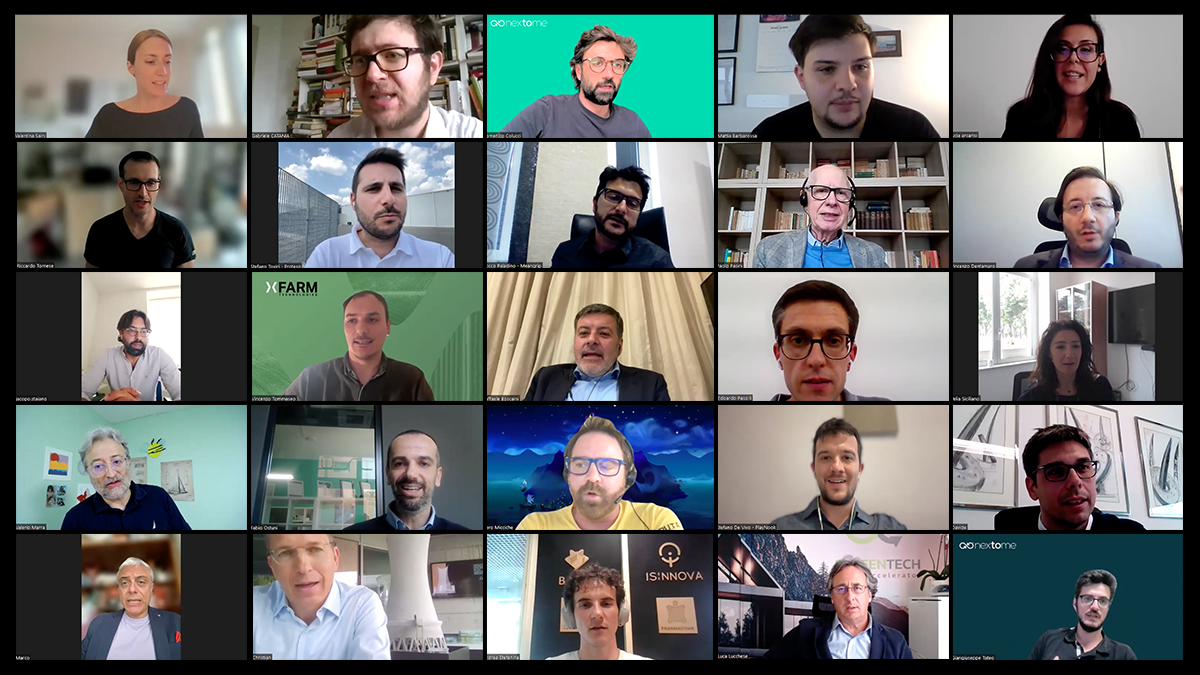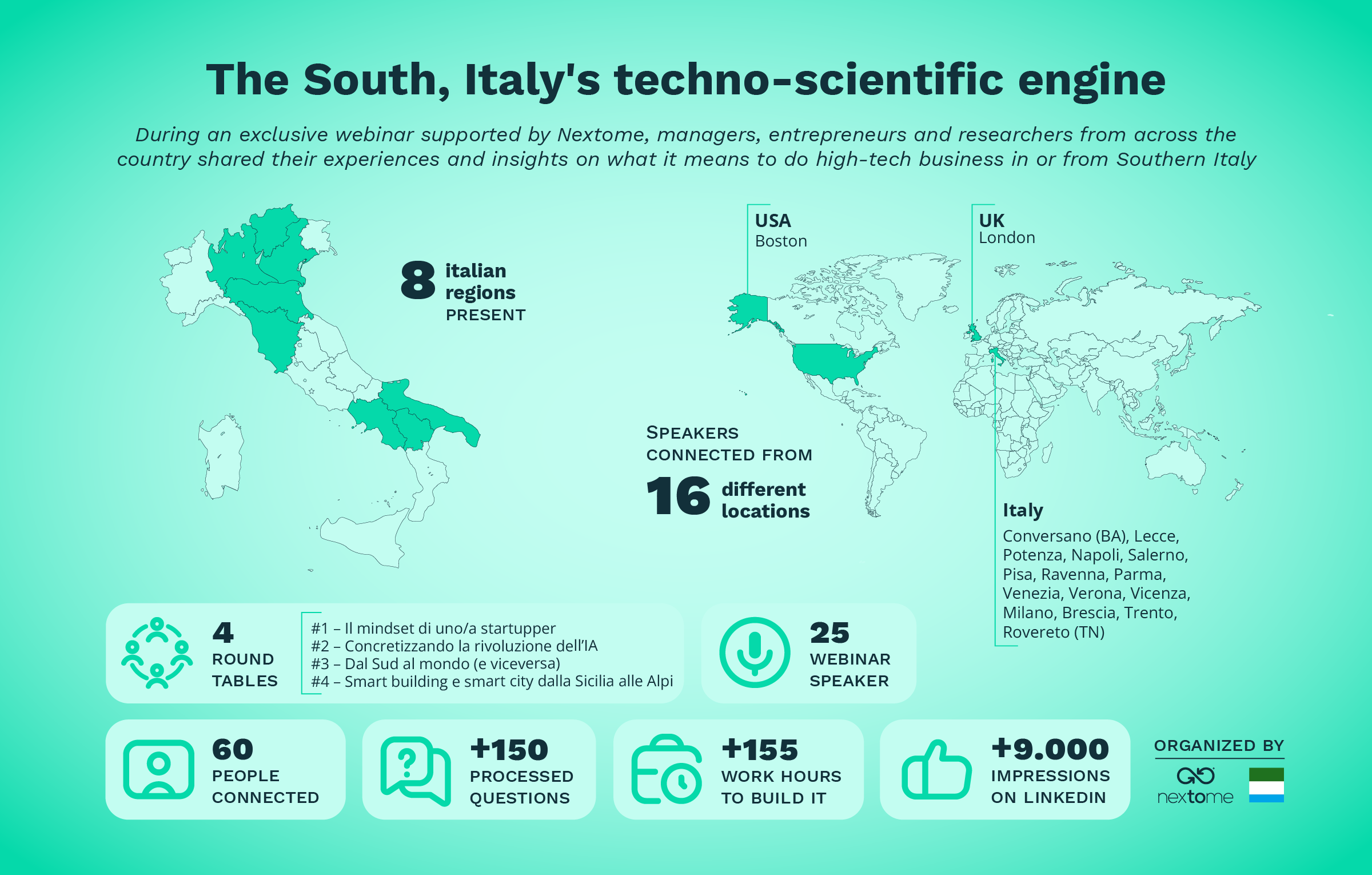The South, a great development opportunity for Italian companies and start-ups
On 28th May the webinar "The South, Italy's techno-scientific engine" took place, organised by Bericus, an analysis, training and internationalisation company, with the support of Nextome, a leading RTLS company based in Puglia. 25 high-profile speakers – managers, researchers and start-up founders – not only from Italy, but also from the UK and the USA, connected to participate in the webinar, moderated by journalist Valentina Saini.
One of the aims of the webinar was to raise awareness of the huge techno-scientific potential of Southern Italy, which, thanks to excellent universities and research centres, and high-quality companies and start-ups, is able to attract investments from knowledge-intensive companies from the rest of Italy and the world. During his keynote speech, Mattia Barbarossa, CEO of the space startup Sidereus Space Dynamics and a Campanian by birth, said that creating a startup means being able to adapt quickly and to accept the blows of fate, and that doing so in southern Italy is like "running a marathon in the desert: you don't have the resources, but you also don't have the obstacles, the competitors" that you have in the US, for example.
"The South's ability to innovate is leading to an unprecedented dynamism, also in economic terms," said Gabriele Catania, geopolitical analyst and president of Bericus. "And the growing global instability is not only a challenge but also an opportunity for the South, as it can favour reshoring and friendshoring".ù

The topic of the first webinar roundtable was the kind of mindset required to launch a start-up. Domenico Colucci, co-founder and COO of Nextome, explained that being an entrepreneur in the South (and everywhere) takes a lot of perseverance and the humility to "be able to listen to the customers, adapt the product to their needs and go towards the market". Colucci, who described Nextome's journey from its beginnings to the important results achieved in recent years, focused on the pros and cons of doing business in the South. On the one hand, you can enjoy a good quality of life, "work while looking at the sea", and draw on a pool of talented professionals; on the other hand, there is a disadvantageous, albeit diminishing, infrastructure gap. For example, the most efficient way to get from Bari to northern Italy is by plane.
Lucia Arcarisi CEO of Weabios, Riccardo Tornese CEO of Tactile Robots, Rocco Paladino CEO of Meangrip Game Studios, and Stefano Toxiri CEO of Proteso, shared their experiences as high-tech start-up founders. Of particular interest was the presentation by Paolo Pasini, HR Department Development of UNITEC, who outlined the history of the company, a world leader in sorting solutions and technologies for fruit and vegetable processing, was especially interesting. According to Pasini, having an entrepreneurial mindset means forming "an alliance with the customer". Indeed, UNITEC's mantra is to work with customers to achieve maximum efficiency and quality.
The second round table, entitled "Making the AI revolution a reality", brought together prominent experts and managers to analyse the impact of AI on the driving sectors of Southern Italy's economy. The speakers at this round table were Edoardo Pasolli, associate professor at the University of Naples Federico II, Jacopo Staiano, researcher at the University of Trento, Raffaele Boscaini, marketing director at Masi Agricola, Vincenzo Dentamaro, founder of Nextome and researcher at the University of Bari "Aldo Moro" and Vincenzo Tommaseo, Agronomic Products Specialist at xFarm Technologies. Dentamaro used interesting examples to explain the impact that AI can have on retail and warehouse management.

During the third round table, "From the South to the World (and vice versa)", researchers and managers from Puglia, Campania, Sicily and Basilicata shared their experiences abroad and with foreign countries. For example, Valerio Marra, International GTM Executive & Multiphysics Simulation Engineer who was born in Taranto but has lived in Boston for years, shared some of the lessons he learned in the United States: being open to experimentation, not being afraid to fail, and the will to give everyone a chance. Gero Micciché, Electronic Arts's Development Director, originally from Sicily, said that in the UK, diversity of culture, background, etc. is seen as a key asset. But while going abroad to study and work is an opportunity for growth, returning home and contributing to the progress of one's community is rewarding: after MIT Boston and Imperial College London, for example, Neapolitan Velia Siciliano returned to her hometown, where she is a principal investigator tenured at the IIT Centre in Naples. Dr. Siciliano recalled two strengths of Italians abroad: versatility and adaptability. Stefano De Vivo, COO of the audio games startup PlayNook, praised Bari's profound transformation in the last 10-15 years, while Fabio Ostuni, Sales and Business Development at Nextome, stressed that an innovative company can work with major international players and attract talent even if it's based in a southern town. Davide Colangelo, CEO of Digital Lighthouse, a high-tech company based in Basilicata but with national and international projection, spoke of the outstanding potential of his region, thanks also to good universities, a high quality of life and an efficient public administration.
The fourth and final round table focused on smart buildings, smart cities and the modernisation of the building stock throughout Italy, from south to north. The speakers were Marco Citro, CEO of BioBuildingBlock, Luca Lucchese, director of investor Spreentech Ventures, Andrea Stefanina of Isinnova M&C, Christian Sottana, strategic director of Venezia Heritage Tower and Giangiuseppe Tateo, founder of Nextome and Product and Platform Leader. Tateo explained how Nextome has contributed to an important project in the field of smart mobility, an essential element of the cities of the future, thanks to its location systems, in particular a passenger tracing technology.
